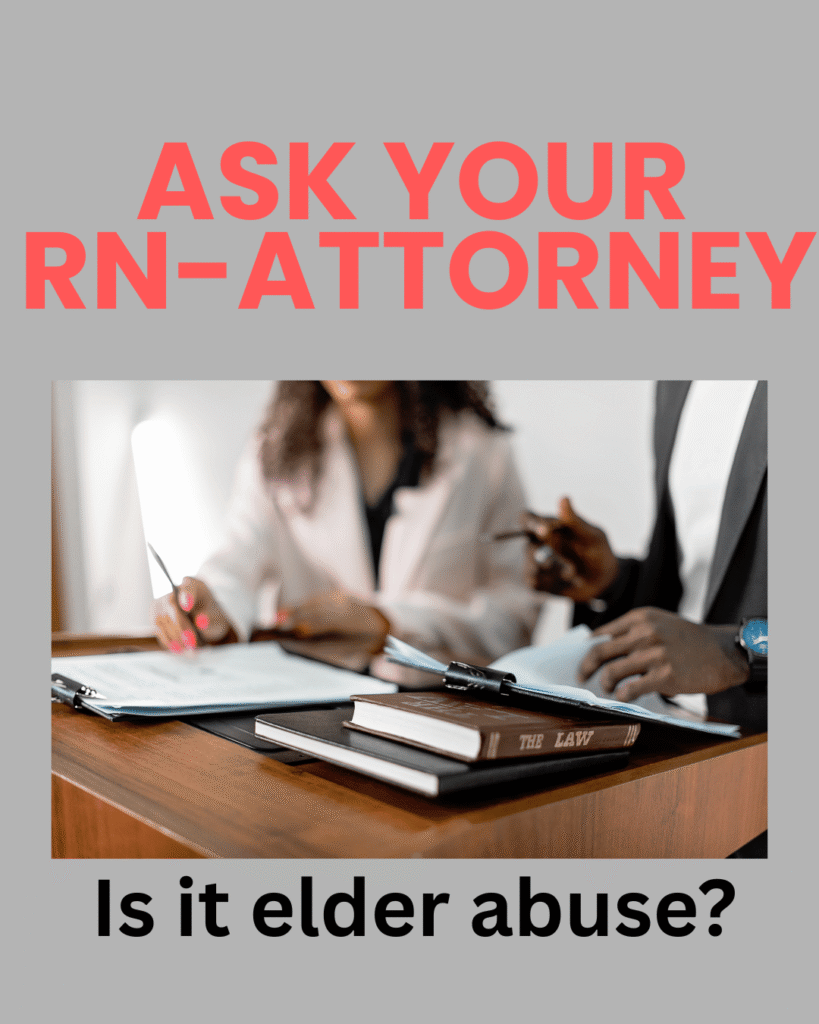“My moms in a nursing home, and lately, when I visit, she doesn’t say much, and she stares at the ground when a caregiver enters the room. The caregivers are always sweet in front of me. Mom has lost a lot of weight, and the nursing home staff says she’s ‘has no appetite.’ Could there be elder abuse, or am I overreacting?”
As an RN Attorney, this is a question I hear variations of. It’s a tough scenario. The answer to this question is: maybe. Perhaps your mother is experiencing a decreased appetite with aging, has another medical condition, or is depressed? However, the changes you see in your mother warrant investigation because elder abuse isn’t always obvious physical violence. In fact, it often hides in plain sight, masked by subtle changes that are easy to dismiss.
As a Registered Nurse (RN) who then became an attorney, my unique perspective allows me to bridge the gap between medical signs and legal definitions. My goal is to help you understand what elder abuse truly is in California and why having an RN Attorney on your side can be crucial when you suspect something is wrong.
Defining Elder Abuse in California
In California, the law protects individuals aged 65 and older (known as “elders”) and dependent adults (ages 18-64 with physical or mental limitations). The main laws for civil elder abuse cases are in the Elder Abuse and Dependent Adult Civil Protection Act (EADACPA), found in the California Welfare and Institutions Code.
The act defines elder abuse as:
- Physical Abuse: This includes assault, battery, unreasonable physical restraint, or prolonged deprivation of food or water. It also covers sexual assault and the improper use of chemical restraints (like over-medication).
- Neglect: This is a key area where subtle signs can easily be missed. Neglect is the failure of anyone having care or custody of an elder to exercise the degree of care a reasonable person would. This can include:
- Failure to assist with personal hygiene.
- Failure to provide adequate food, clothing, or shelter, leading to malnutrition or dehydration.
- Failure to provide appropriate medical care for physical and mental health needs.
- Failure to protect from health and safety hazards (like falls).
- Financial Abuse: This occurs when someone wrongfully takes or uses an elder’s money, property, or assets for their own wrongful use or with intent to defraud. This can range from theft to undue influence over financial decisions.
- Abandonment: The desertion of an elder by someone who has assumed responsibility for their care.
- Isolation: Intentionally preventing an elder from receiving mail, telephone calls, or visitors.
- Abduction: The removal of an elder without proper consent (especially relevant for those under conservatorship).
- Other Treatment Resulting in Harm or Suffering: This is a broad category that covers any other treatment leading to physical harm, pain, or mental suffering.
The important takeaway here is that elder abuse is not always about visible bruises. It can be a pattern of neglect, emotional manipulation, or financial exploitation that erodes an elder’s well-being and dignity.
Why Being a Nurse Attorney is Critical
When a family suspects elder abuse, especially in a nursing home or care facility, the situation is often complex and highly emotional. This is where the unique skill set of an RN Attorney becomes invaluable.
- Understanding Medical Records: As an RN, I’m trained to read, interpret, and understand intricate medical charts, physician’s orders, nursing notes, and lab results. I can identify inconsistencies, missing documentation, or red flags that might indicate a lack of proper care or a deviation from accepted medical standards. For instance, in the example above, an RN would recognize that “not eating much” is a medical problem that requires investigation, not just a casual observation, and would look for documentation of interventions, weight monitoring, and nutritional assessments.
- Identifying Subtleties of Neglect: Many forms of elder abuse, particularly neglect, manifest through subtle medical and behavioral changes. An RN understands the clinical implications of bedsores, dehydration, unexplained weight loss, frequent infections, or sudden changes in mental status. My nursing eye helps me see beyond the obvious, recognizing how seemingly minor issues can accumulate.
- Communicating with Medical Professionals: Navigating the healthcare system and communicating with doctors, nurses, and other care staff can be daunting. As an RN, I speak their language. This facilitates clearer communication, more effective information gathering, and the ability to challenge or confirm medical opinions when necessary.
By connecting the dots between medical evidence, care deficiencies, and the legal definition of abuse, an RN Attorney can comprehensively investigate a claim of elder abuse and in the case of abuse, assist a family in successfully brining a claim against the nursing home.
If you suspect elder abuse in any form, don’t dismiss your concerns. Your instincts are often correct. The first steps are to gently broach the topic with your mother, if she is mentally competent and to discuss your concerns with your mother’s doctor and the nursing staff. Additionally, reaching out to an attorney who understands both the legal and medical aspects can make all the difference in protecting your loved one, seeking the justice they deserve, and creating a safer system of elder care in our country.

